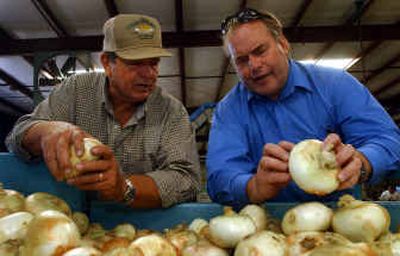Onion farmers cry foul

VIDALIA, Ga. — The warehouse fills with the earthy aroma of thousands of Vidalia onions tumbling on conveyor belts as R.T. Stanley starts his season with a mix of science and salesmanship — placing labels on his onions that declare them as “certified extra sweet.”
Many of his fellow growers call it an illegal gimmick. But Stanley sees the labels as a necessary competitive edge, and so he paid a private company $100,000 this year to sample his fields, test his crop and scientifically certify what Vidalia growers have claimed for decades, that nobody in the world grows a sweeter onion.
“Look at all the so-called sweet onions out there,” says Stanley, who has grown Vidalias for 41 years. “If we don’t show the rest of the world we’re willing to stand up and compete with them, they’re going to run over us.”
The marketing move by Stanley and three other growers has rekindled a seven-year-old court battle with Vidalia farmers who say the “certified” stickers promote a false notion that unlabeled onions are impostors.
Opponents accuse the company behind the voluntary labels of trying to skim profits from Georgia’s $75 million Vidalia onion industry. If grocers demand the labels, they say, farmers will be pressured to embrace certification although the state doesn’t require or regulate it.
“We could be forced into it,” said Ronny Collins, one of 13 Vidalia growers who are suing over the labels. “I hope that doesn’t happen because it’s adding additional costs to us, which we do not need.”
Vidalia onions are grown only in a 20-county region of south Georgia, where the low-sulfur soils and mild climate are key ingredients to the crop’s signature sweetness.
The area seemed ripe for business when David Burrell opened National Onion Labs in nearby Collins in 1998.
For a price of $60 to $100 an acre, the company says it can determine with 95 percent accuracy the sweetness of a farmer’s entire crop using lab tests. It then helps growers market onions based on the results.
The testing method, developed at the University of Georgia, measures pyruvic acid in onions collected from farmers’ fields in samples of 20 per acre. The science in a nutshell: Pyruvic acid makes onions taste hot, so sweeter onions have lower acid levels.
The Georgia lab also certifies onions grown in Washington state, Oregon and Texas with its “certified sweet” and “certified extra sweet” labels, as well as imports from Mexico and South America.
Burrell, the company president, says Vidalia growers need to sign on to defend against a rash of competitors that have emerged since Vidalia virtually created a niche market for sweet onions in the 1980s. Many uncertified onions sold as sweet, he says, are really downright hot.
“Because of a lack of any regulatory definition of what a sweet onion is, there’s a huge lack of integrity,” Burrell said.
Burrell’s approach to science-based sweet onion promotion got a sour response from Vidalia growers, who obtained a court order stopping him from certifying Vidalia onions in the first month of the 1998 season.
Seven years later, on April 13, a judge voided that order and said Burrell is free to contract with Vidalia growers to certify their onions pending the outcome of a new lawsuit by the 13 opposing farmers.
The farmers say the “certified” labels sound more like a government stamp of approval than a voluntary award by a for-profit company.